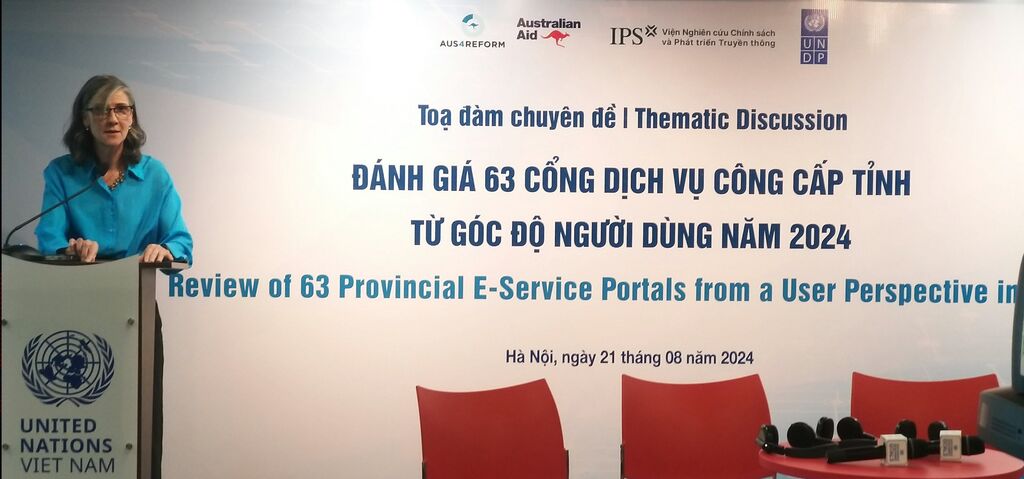 |
| UNDP Resident Representative Ramla Khalidi speaks at the thematic discussion in Hanoi__Photo: VLLF |
All provinces and cities need to invest in enhancing their provincial e-service portals (PESPs) in terms of convenience, user-friendliness, and accessibility, meeting the needs of all users, experts said at a thematic discussion held on August 21 in Hanoi.
The Thematic Discussion, titled “Review of 63 Provincial E-Service Portals from a User Perspective in 2024”, was jointly organized by the United Nations Development Program (UNDP) in Vietnam and the Institute for Policy Studies and Media Development (IPS). This marks the second year that IPS has undertaken this review.
In his opening remarks, Mr. Nguyen Minh Hong, Chairman of the Vietnam Digital Communications Association emphasized that “Evaluating public service portals from the user's perspective is extremely important to ensure that digital transformation meets the needs and expectations of the public.”
According to the evaluation results, in general, PESPs have not served users effectively and have yet to achieve the primary goal of providing convenience for users in performing administrative procedures. Most users must rely on direct guidance or assistance from civil servants at one-stop shops.
UNDP Resident Representative Ramla Khalidi said “The good news is that, compared to 2023, more provincial e-service websites are now accessible to persons with disabilities”.
However, she highlighted that there is still substantial room to make e-services more convenient, more user-friendly, and more accessible to all. As more disadvantaged citizens and underserved communities gain access to online public administrative services, Vietnam will become a more inclusive society, she added.
The research results indicate that up to 60 PESPs did not meet the “Personal data protection and privacy” criterion and 39 PESPs did not meet the “Access for people with disabilities" criterion. Most PESPs were at the average level in terms of compatibility with both computers and smartphones. None of 63 PESPs have achieved attained more than 50 percent of the evaluation criteria at a ‘good’ level. Additionally, the differences between PESPs’ evaluation scores are minimal.
To enhance the effectiveness of PESPs, the report recommends that provinces should conduct self-reviews of their online public administrative services (OPAS) platforms to improve user-friendliness, particularly for ethnic minorities and people with disabilities.
The most important aspect is embracing a Digital-First Approach, focusing on developing OPS policies from a “digital governance” mindset, which emphasizes natural interaction in the digital environment between service providers and users.
Legal documents related to administrative procedures need to be revised to better align with the digital environment. Besides, the implementation of administrative procedures that are not bound by administrative boundaries should also be prioritized.- (VLLF)









